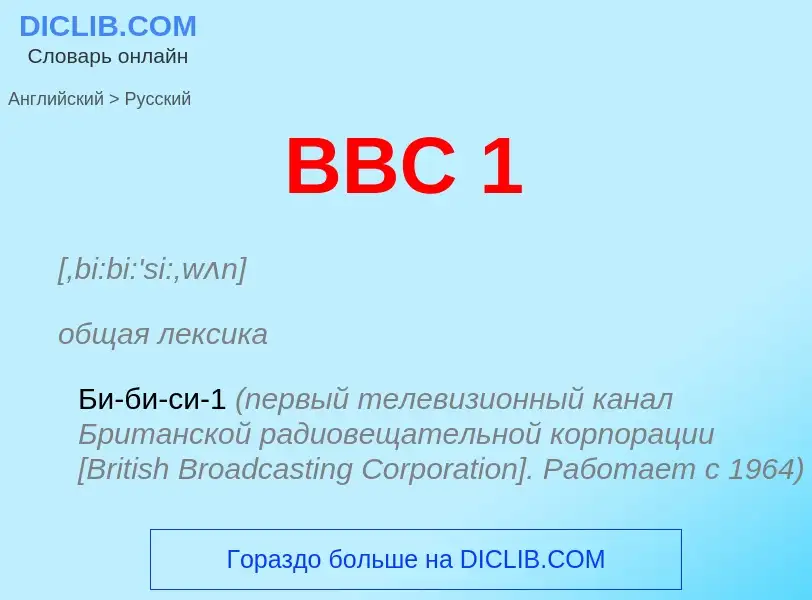Traduction et analyse de mots par intelligence artificielle ChatGPT
Sur cette page, vous pouvez obtenir une analyse détaillée d'un mot ou d'une phrase, réalisée à l'aide de la meilleure technologie d'intelligence artificielle à ce jour:
- comment le mot est utilisé
- fréquence d'utilisation
- il est utilisé plus souvent dans le discours oral ou écrit
- options de traduction de mots
- exemples d'utilisation (plusieurs phrases avec traduction)
- étymologie
BBC 1 - traduction vers Anglais
[,bi:bi:'si:,wʌn]
общая лексика
Би-би-си-1 (первый телевизионный канал Британской радиовещательной корпорации [British Broadcasting Corporation]. Работает с 1964)
[,bi:bi:'si:,tu:]
общая лексика
Би-би-си-2 (второй телевизионный канал Британской радиовещательной корпорации [British Broadcasting Corporation]; отводит много места культурно-просветительным, учебным и политическим передачам. Работает с 1964)
[,bi:bi:'si:,sɪmfənɪ,ɔ:kɪstrə]
общая лексика
Симфонический оркестр Би-би-си (один из ведущих оркестров; его концерты обыкн. передаются по радио и телевидению)
Définition
Wikipédia
BBC One is a British free-to-air public broadcast television channel owned and operated by the BBC. It is the corporation's flagship channel and is known for broadcasting mainstream programming, which includes BBC News television bulletins, primetime drama and entertainment, and live BBC Sport events.
BBC One was launched on 2 November 1936 under the name BBC Television Service, which was the world's first regular television service with a high level of image resolution. It was renamed BBC TV in 1960 and used this name until the launch of the second BBC channel, BBC2, in 1964. The main channel then became known as BBC1. The channel adopted the current spelling of BBC One in 1997.
The channel's annual budget for 2012–2013 was £1.14 billion. It is funded by the television licence fee together with the BBC's other domestic television stations and shows uninterrupted programming without commercial advertising. The television channel had the highest reach share of any broadcaster in the United Kingdom as at 2019, ahead of its traditional rival for ratings leadership ITV. In 2013, a major global study of the BBC by the Populus polling organisation found BBC One to be rated the highest-quality TV channel in the world, with BBC Two coming in third place.


![BBC SO rehearsing for the [[Last Night of the Proms]] in September 2011 BBC SO rehearsing for the [[Last Night of the Proms]] in September 2011](https://commons.wikimedia.org/wiki/Special:FilePath/BBCSO rehearsing for the last night of the Proms.jpg?width=200)
![Weingartner]] Weingartner]]](https://commons.wikimedia.org/wiki/Special:FilePath/Boult-guests1.jpg?width=200)

![John Reith]], Director-General of the BBC John Reith]], Director-General of the BBC](https://commons.wikimedia.org/wiki/Special:FilePath/INF3-49 Sir John Reith Artist Wooding.jpg?width=200)
![[[Leonard Slatkin]] [[Leonard Slatkin]]](https://commons.wikimedia.org/wiki/Special:FilePath/Leonard Slatkin 2004.jpg?width=200)
![[[Percy Pitt]], the BBC's first director of music [[Percy Pitt]], the BBC's first director of music](https://commons.wikimedia.org/wiki/Special:FilePath/Percy-Pitt-1910.jpg?width=200)
